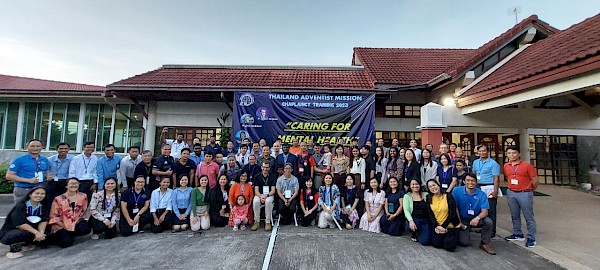Southern Asia-Pacific Division
The official website of the Southern Asia-Pacific Division of the General Conference of Seventh-day Adventists
News
Adventist Chaplains Gather in Thailand for Mental Health Training

Chaplains from the Adventist Church in Southeastern Asia (SEUM) convened at the Health Promotional Center in Muak Lek, Thailand, from October 20 to 23 for an intensive chaplaincy training program with a special focus on "Caring for Mental Health." This essential training aimed to equip chaplains with the fundamental knowledge and skills necessary to assist both themselves and the individuals they interact with in various work settings. The event was hosted by the Thailand Adventist Mission under the guidance of Pastor Tran Quoc Khoi, the SEUM chaplaincy director.
The delegates comprised key members of various organizations, including school directors and administrators, school and hospital chaplains, as well as teachers. More than 70 participants from Thailand, Cambodia, and the Western Border Attached Region came together to enhance their understanding of chaplaincy in the context of mental health.
Dr. Siroj Sorajjakool, a distinguished Adventist philosopher with a background as a chaplain at Loma Linda Hospital and a former president of Asia-Pacific University, offered a profound perspective on the role of chaplains. He emphasized the crucial distinction between pastors and chaplains, stating, "Chaplains do not fix, convert, or bring God to the people, nor bring people to God." He emphasized that chaplains are not psychotherapists but are there to "listen and help people navigate through life events and circumstances, so they can find a deep sense of meaning in their lives." When encountering individuals suffering from depression or mental illness, chaplains' primary role is to provide support, ensure that their voices are heard, and guide them to seek professional medical assistance, standing by them throughout their journey to recovery.
Dr. Torben Bergland, associate health director for the General Conference, shed light on the significance of understanding mental health for chaplains. He stressed that depression is a common condition that can affect anyone, particularly the younger population, and in severe cases, can lead to suicide. Educating chaplains about mental health is essential, as they must first be self-aware and in good mental health themselves before assisting those in need. Dr. Bergland advised against forcing help on individuals who may deny their depression, emphasizing the importance of building supportive relationships and extending love and care.
Dr. Bergland cautioned chaplains against diagnosing mental health issues, as they are not psychologists. Instead, their role is to provide support, basic knowledge, and skills, and to guide individuals toward professional help when necessary. He also introduced the resources available on the Reminded website, "Stop. Pause. Play, When Life Requires a Restart," which offers additional materials for chaplains and individuals seeking self-study and assistance on understanding and addressing depression and mental illness.
The training program extended its reach beyond chaplains to individuals actively engaged with others, particularly in the school setting. Dr. Surapee Sorajjakool, SEUM Education Director, emphasized the pivotal role of chaplains in schools. Chaplains in educational settings serve as crucial connectors, offering one-on-one care, mentoring, and support for students, parents, and staff. Their role goes beyond academics and extends to students' social, emotional, and spiritual well-being.
As an expert in the field, Dr. Surapee highlighted that chaplains can serve as role models in chaplaincy services, fostering holistic development in students. She encouraged the implementation of ISR (Being, Authentic, Skills, and Role) in chaplaincy to create a Christ-centered learning community that nurtures students for both their present and eternal service, establishing Adventist schools as shining lights in their communities.
Chaplaincy, as Dr. Surapee stressed, is not just a job but a calling, a mission to connect and guide people through life's challenges. It's a journey of being, not just knowing. As adherents of the Christian faith, they consider it imperative to fill their hearts with love, letting love serve as the driving force of their beliefs. They hold a firm conviction that they should never turn a blind eye to individuals who are grappling with depression or facing mental health issues; instead, their unwavering commitment lies in actively seeking ways to assist and provide support on the journey to recovery and healing.
Manthana Oangkanayotkiree, SEUM Communication Department
Our Beliefs
Seventh-day Adventist beliefs are meant to permeate your whole life. Growing out of scriptures that paint a compelling portrait of God, you are invited to explore, experience and know the One who desires to make us whole.